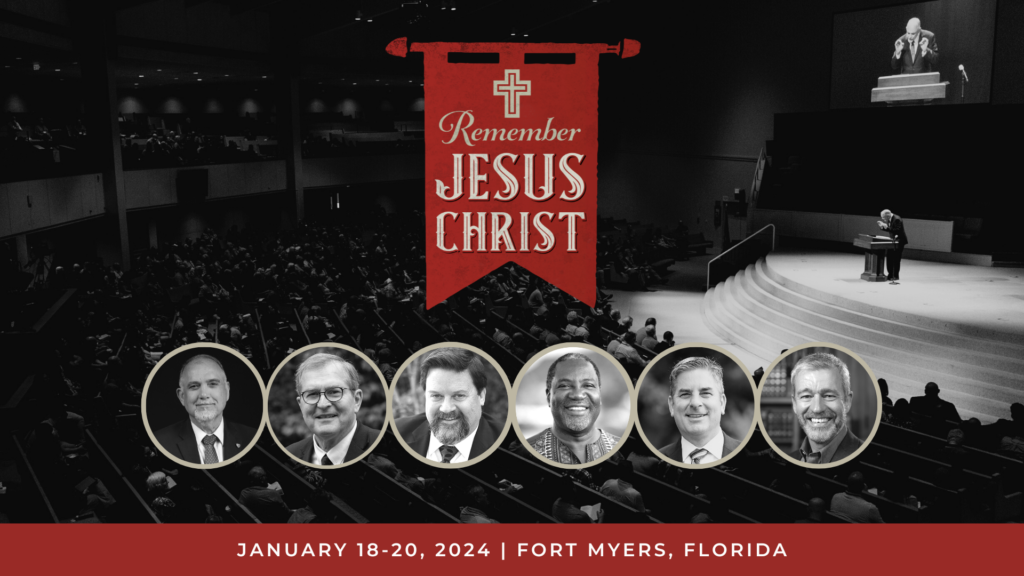This article is part 4 in a series by Tom Nettles on Remembering Jesus Christ. You can read part 1, part 2 and part 3.
Having examined the theological importance of the call “Remember,” we want to examine some points of New Testament admonition in which the substance of the command is at work. As Jesus prepared his disciples for his departure, he promised them the help of the Holy Spirit. One operation of the Spirit that served the cause of redemption and the full truthfulness of the apostolic recording of it was couched in the promise of Jesus: “These things I have spoken to you while being present with you. But the Helper, the Holy Spirit, whom the Father will send in my name, He will teach you all things, and bring to your remembrance all things that I said to you” (John 14:25, 26). The faculty of memory under the teaching of the Holy Spirit became the avenue for a theological and spiritual transformation. They had heard the words of Jesus, but none of the disciples grasped their meaning, and certainly not their world-transforming importance. But, when the Spirit of truth came and brought these words to their “remembrance,” the message was sealed in their thought and its overturning power in an upside-down world became the theme of their lives and their hope of eternal life.
At the empty tomb we have the first post-resurrection call to “Remember.” When women arrived very early in the morning following the sabbath and found the tomb empty, an angel said to them, “Remember how he spoke to you when he was still in Galilee, saying ‘The Son of Man must be delivered into the hands of sinful men, and be crucified, and the third day rise again’” (Luke 24:6, 7). As they gazed into the empty grave where they had observed that his body was laid, the angel asked them to gather the words of Jesus into their minds and to consider with their hearts that the dark emptiness they saw was in itself a settled and infallible proof of the truth of Jesus’ words and the confirmation of his person and work. Had they remembered these words before the angel prompted them, they would have known what had happened. “Jesus has risen just as he said. Death is conquered, sin is forgiven; eternal life is the unfading, immutable reality.”
When Paul wrote of his amazement that some in Galatia were “turning away so soon from him who called you in the grace of Christ to a different gospel,” (Galatians 1:6) he expressed the result of a failure to “Remember Jesus Christ.” When he gave his statement of being “crucified with Christ” and the results of that identity in death with Christ (Galatians 2:20, 21), he was showing what it means to “Remember Jesus Christ.” When he told the Galatians, “If you become circumcised, Christ will profit you nothing,” he showed what it means to “Remember Jesus Christ.” If you remember Jesus Christ the gospel is clear, the cross is dear, and the ceremonial law with its burdensome reminders—sin not yet atoned, hearts still in need of circumcision—will disappear.
When Paul closed his letter to the Ephesians with the benediction, “Grace be with all those who love our Lord Jesus Christ in sincerity” (Ephesians 6:24), he highlighted the benefit of a remembrance of Jesus Christ. When he told the Philippians that neither endearment nor rivalry was of importance to him as compared to the greatness of the gospel, he remembered Jesus Christ. Paul expressed it on that occasion in this way: “What then? Only that in every way whether in pretense or in truth, Christ is preached and in this I rejoice, yes, and will rejoice” (Philippians 1:18). When Paul gave his extended and exalted expositions of the person and work of Christ in Colossians, he pressed those believers, “As you therefore have received Christ Jesus the Lord, so walk in him, rooted and built up in him and established in the faith, as you have been taught, abounding in it with thanksgiving“ (Colossians 2:6, 7). This is a way of saying, “Remember Jesus Christ.” And when he reminded them that all of the ceremonial law had been fulfilled and put to rest with the words, “but the substance is of Christ,” (Colossians 2:17), he was telling them that the answer to every challenge of philosophy and short-circuited theology is to “Remember Jesus Christ.” When he told the Thessalonians to “stand fast and hold the traditions which you were taught, whether by word or epistle,” (2 Thessalonians 2:15), he is saying “Remember Jesus Christ.” In demonstration of this, Paul goes on to say, “Now may our Lord Jesus Christ Himself, and our God and Father, who has loved us and given us everlasting hope by grace, comfort your hearts and establish you in every good word and work” (2 Thessalonians 2:16, 17). To stand fast in those things handed down from the apostles is to find safety in Jesus Christ for he has manifested saving grace in that the Father in grace has given him to us for comfort now and everlasting hope in the eternal future. What courage, conviction and consolation is found in the gracious call, “Remember Jesus Christ!”
When Paul highlighted the extent of the saving grace of Christ, he told Timothy, “Christ Jesus came into the world to save sinners, of whom I am chief” (1 Timothy 1:15). Paul pointed to his saving confrontation with Christ as the pattern of how deep and infinitely gracious and powerful and how certain is the determination of Christ to save: “In me Jesus Christ might show all longsuffering as a pattern to those who are going to believe on Him for everlasting life.” Looking at his life and seeing its subjection to the one whom he persecuted, Paul was saying, “Remember Jesus Christ.”
When John warned against false prophets and gave the test, “Every spirit that confesses, ‘Jesus Christ has come in the flesh,’ that one is of God; and every spirit that does not confess that very Jesus, that spirit is not of God” (1 John 4:2, 3). By his revelation in a body when the eternal word was made flesh (John 1:14), the eternally covenanted grace of God made the way for righteousness, forgiveness, resurrection, and glorification. Only “the man, Christ Jesus” (1 Timothy 2:5) has done, and even could do, such deeds of grace and power. You have not remembered Jesus Christ if you do not remember that the incarnation was the sphere in which every redemptive act must of necessity be accomplished.
Jude changed from writing an expressive exposition of the shared faith of Christians (Jude 3) in order to present a distilled warning against men of heretical doctrine and perverse lives. He told them “Remember the words which were spoken before by the apostles of our Lord Jesus Christ” (Jude 17). In addition to their pursuit of all the “ungodly deeds” recorded in Scripture, a fatal doctrinal error undergirded their energy in turning the “grace of our God into lewdness;” that is, “they deny the only Lord, even our Lord Jesus Christ” (Jude 4). They denied the Lord because they did not remember “the words” previously spoken “by the apostles.” Had they remembered, in the biblical sense of mental submission to the eternal truths of the covenant, they would have been warned of the perversity of unbelief and have kept themselves “in the love of God, looking to the mercy of our Lord Jesus Christ unto eternal life” (Jude 21). How salubrious and safe is the command, “Remember Jesus Christ.”
This article is part 4 in a series by Tom Nettles on Remembering Jesus Christ.
Join us at the 2024 National Founders Conference on January 18-20 as we consider what it means to “Remember Jesus Christ” under the teaching of Tom Ascol, Joel Beeke, Paul Washer, Phil Johnson, Conrad Mbewe and Travis Allen.
























